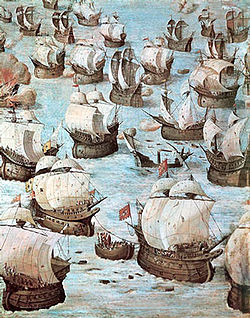Battle of Vila Franca
| Battle of Ponta Delgada | |||||||
|---|---|---|---|---|---|---|---|
| Part of the War of the Portuguese Succession | |||||||
 Fresco by Niccolò Granello showing the Battle of Ponta Delgada in the Hall of Battles at El Escorial. |
|||||||
|
|||||||
| Belligerents | |||||||
|
|
|
||||||
| Commanders and leaders | |||||||
|
|
|
||||||
| Strength | |||||||
| 60 warships | 28 warships | ||||||
| Casualties and losses | |||||||
| 1,500 dead, 1,500 wounded, missing or captured, 7 ships missing, 4 ships sunk, 2 ships burned, 4 ships captured |
224 dead, 550 wounded |
||||||
The naval Battle of Ponta Delgada, Battle of São Miguel or specifically the Battle of Vila Franca do Campo took place on 26 July 1582, off the coast of the island of São Miguel in the Portuguese archipelago of the Azores, during the War of the Portuguese Succession. A combined corsair expedition, mainly French (an Anglo-French fleet with Portuguese forces included), sailed against a Spanish naval force made up of Portuguese and Castilian ships, to preserve control of the Azores under pretender António, Prior of Crato and to defend the islands from incorporation into the Iberian Union—the largest French force sent overseas before the age of Louis XIV.
In the first engagement between large fleets of carracks and galleons operating at great distances from the mainland, the mercenary fleet under Filippo di Piero Strozzi was severely defeated by a squadron under Álvaro de Bazán. The Spanish victory resulted in the rapid Spanish conquest of the Azores, completing the incorporation of Portugal into the Spanish Empire.
The only portion of the Portuguese overseas empire to resist the Habsburg King Philip II of Spain (Philip I of Portugal) were the Azores Islands. The French crown sent a fleet under the command of the mercenary admiral Filipo Strozzi in order to help defend the islands.
King Philip had offered an amnesty to the seven islands if they would surrender, but his messenger met with a very hostile reception at Angra, and retired to the island of São Miguel, which had presented its allegiance to the King of Spain and Portugal.
...
Wikipedia
